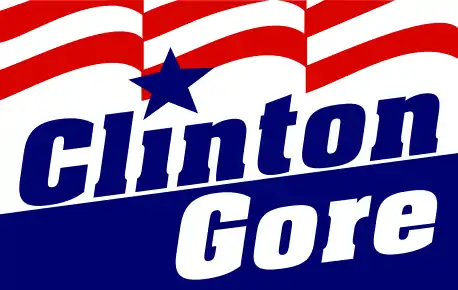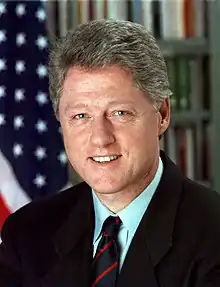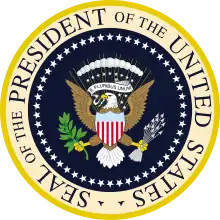Bill Clinton 1992 presidential campaign
The 1992 presidential campaign of Bill Clinton, then Governor of Arkansas, was announced on October 3, 1991 in Little Rock, Arkansas. After winning a majority of delegates in the Democratic primaries of 1992, the campaign announced that then-junior Senator from Tennessee, Al Gore, would be Clinton's running mate. The Clinton-Gore ticket went on to defeat Republican incumbent President George H. W. Bush and Vice President Dan Quayle in the presidential election on November 3, 1992, and took office as the 42nd President and 45th Vice President, respectively, on January 20, 1993.
| Clinton-Gore '92 | |
|---|---|
 | |
| Campaign | 1992 Democratic primaries 1992 U.S. presidential election |
| Candidate | Bill Clinton 40th and 42nd Governor of Arkansas (1979–1981, 1983–1992) Al Gore U.S. Senator from Tennessee (1985–1993) |
| Affiliation | Democratic Party |
| Status | Announced: October 3, 1991 Presumptive nominee: June 2, 1992 Official nominee: July 16, 1992 Won election: November 3, 1992 |
| Headquarters | Little Rock, Arkansas |
| Key people | David Wilhelm (Campaign manager) James Carville (Chief strategist) George Stephanopoulos (Senior strategist, Communications director & Spokesperson) Paul Begala (Senior strategist) Harold M. Ickes (Senior strategist) Rahm Emanuel (Finance director) Dee Dee Myers (Media strategist) Mandy Grunwald (Media strategist) Mickey Kantor (General counsel) Stan Greenberg (Pollster) |
| Slogan | For people for change Putting People First It's the economy stupid! |
Candidate background
Clinton was the governor of a traditionally conservative Southern state, Arkansas. He had been viewed as a viable presidential candidate before his actual bid in 1992. During the 1988 Democratic Party presidential primaries, where George H. W. Bush, the incumbent Vice President, seemed all but inevitable as the president, many turned to Clinton as the next Southern leader of the party. Bill Clinton was seen as a potential candidate as he was a popular Democratic governor in a state that had voted for Republicans in four of the last five presidential elections. Breaking with the traditional left wing platform of the Democratic Party, Clinton espoused the ideas of the Third Way.[1] A former chairmen of the DLC, he ran as a New Democrat.
Timeline
Primaries
In the wake of President George H.W. Bush's sky-high approval ratings after Operation Desert Storm, American media gave the Democratic party little chance of winning the presidency in 1992.[2] Early Democratic front-runners included Bill Bradley, then a New Jersey Senator; Jesse Jackson, who finished second in 1988; Dick Gephardt, a Missouri Representative; Al Gore, then a Senator from Tennessee; and Jay Rockefeller, a Senator from West Virginia. But each bowed out early; neither Bradley nor Rockefeller considered themselves ready to run, Gephardt seemed to accept Bush's re-election as a sure thing, and Gore had opted to spend more time with his family in the wake of a tragic accident that threatened the life of his young son. The most notable front-runner, Mario Cuomo, decided not to run on December 20, 1991, the final day to apply to run in the New Hampshire primary.
In the lead-in to the 1992 New Hampshire Democratic primary, the Clinton campaign was rocked by scandal when Gennifer Flowers accused Clinton of having a 12-year sexual affair. At the same time, Clinton was accused of misleading the U.S. Army Reserve to avoid service in the Vietnam War. [3] Bill and Hillary Rodham Clinton addressed the sexual misconduct allegations in an interview by Steve Kroft on an episode of 60 Minutes aired after the Super Bowl XXVI.[4] Although at that time the Clintons denied an affair, they admitted to have known Flowers and Bill admitted that he had caused problems in their marriage.[5] Although Clinton lost to Paul Tsongas in the New Hampshire primary and suffered from persistent criticism over his character for the rest of the election, he won the Super Tuesday primaries. He ultimately secured the Democratic nomination after winning primaries in Illinois and Michigan, earning him the nickname "The Comeback Kid."[3] At the same time, Bush's lead waned due to his administration's handling of the early 1990s recession and the 1992 Los Angeles riots.[6][7]
Arsenio Hall Show appearance
Clinton was a guest on The Arsenio Hall Show on Wednesday June 3, 1992, the day after he secured the Democratic Party nomination.[8][9][10] He played "Heartbreak Hotel" on the saxophone.[11] The appearance is often considered an important moment in Clinton's political career, helping build his popularity amongst minority and young voters.[9] Clinton's appearance on the show and subsequent media coverage of it, catapulted him ahead of Bush in the polls.[9]
Running mate selection
In June and July 1992, speculation grew about who Clinton was going to pick as his running mate. Possible candidates included Kerrey, Indiana congressman Lee Hamilton, Missouri congressman Dick Gephardt, Tennessee Senator Al Gore, New Jersey Senator Bill Bradley, Florida Senator Bob Graham and Pennsylvania Senator Harris Wofford. On July 9, 1992,[12] Clinton selected Gore as his running mate in the Arkansas State Mansion at Little Rock.
Convention
During the 1992 Democratic Convention, the convention hall was plagued by the fact that independent candidate Ross Perot was tied with or beating Clinton in opinion research polls. This caused a moderate turn of events at the convention to win back Perot Voters from the Perot Campaign. This led to the selection of such speakers such as Representative Barbara Jordan from Texas to deliver a bipartisan keynote address to the convention delegates. Also speaking was the Vice-Presidential nominee Al Gore who appealed to the center as he was, at the time, a Southern Moderate Democrat from Tennessee.
However, on the last day the convention convened on July 16, 1992, Ross Perot dropped out of the presidential race and left a gap for both Bush and Clinton to scramble for newly undecided voters. This greatly led to the advantage of Bill Clinton who gave his nomination acceptance speech that night.
Election Night 1992
Throughout election night, Clinton over performed in rural areas of the country such as in the mountain west, winning Montana, Colorado, and New Mexico (16 Electoral Votes). Clinton also won rural voters in the south and mid-west, carrying states such as Missouri, Arkansas, Tennessee, Kentucky, West Virginia, Louisiana, Georgia, and Iowa (57 Electoral Votes).
Campaign strategy
The Southern lock
A source of frustration for Democrats after the adoption of Richard Nixon's Southern strategy was the increasing Republican lock on the electoral votes of the Southern United States. Clinton's home of Arkansas gave Democrats hope that they could carry some Southern states and ultimately win the election. Clinton then made what even his opponents acknowledged was a master stroke by choosing Al Gore, a Senator from Tennessee, as his running mate. This choice blunted a major strategy of the Bush campaign to paint Clinton and Gore as 'Northern liberals' in the mold of previous candidates George McGovern, Walter Mondale, Michael Dukakis, and, to a lesser extent, Hubert Humphrey. Additionally, Gore's prior military record removed much of the criticism Clinton had received earlier.
Besides Gore, several names were rumored to be in contention for the second spot, including Florida Senator and former Governor of Florida Bob Graham, Indiana Congressman Lee H. Hamilton, Nebraska Senator and former Governor Bob Kerrey, Iowa Senator Tom Harkin, and newly elected Pennsylvania Senator Harris Wofford.
President Bush's approval ratings
For most of 1991, the incumbent president, George H.W. Bush, was extremely popular after the Persian Gulf War, with approval rating at times reaching as high as 90 percent. That war had helped erase the Vietnam Syndrome America had felt since the 1960s, restoring confidence in the country's ability to assert itself militarily abroad. But because of a growing public perception of an economic downturn, Bush's popularity began falling throughout late 1991, and by February 1992, his approval rating fell below 40%. Bush's approval would stay low for the rest of the campaign season.[13]
Reasons for victory

Clinton's charisma, combined with a talented campaign staff and skilled campaign strategy, led to victory. Organizational theorists have proposed that his campaign structure adopted an effective blend of informality with clear goal definition, which allowed for structured creativity. There was also the Ross Perot factor, as he took many votes from the angry base due to Bush's breaking of the no tax pledge. Bill Clinton also focused on the economy in 1992 due to the recession and ran on school choice, balanced budget amendment, opposition to illegal immigration and support for NAFTA.
References
- https://www.nytimes.com/1992/09/26/us/1992-campaign-democrats-clinton-says-he-s-not-leaning-left-but-taking-new-third.html
- https://www.nytimes.com/1991/04/07/weekinreview/the-nation-1992-election-is-far-off-but-not-far-enough-for-some.html
- Guide to U.S. elections. Kalb, Deborah (Seventh ed.). Thousand Oaks, California. 24 December 2015. ISBN 978-1-4833-8035-3. OCLC 935494263.CS1 maint: others (link)
- "THE 1992 CAMPAIGN; Clintons to Rebut Rumors on "60 Minutes"". The New York Times. 1992-01-25. ISSN 0362-4331. Retrieved 2020-08-31.
- "Washingtonpost.com Special Report: Clinton Accused". www.washingtonpost.com. Retrieved 2020-08-31.
- Warren, Kenneth F., 1943- (2011). Encyclopedia of U.S. campaigns, elections, and electoral behavior. Sage. ISBN 978-1-84972-549-1. OCLC 755061870.CS1 maint: multiple names: authors list (link)
- Pomper, Gerald M. (2010). The New York Times on critical elections, 1854-2008. CQ Press. ISBN 978-1-60426-583-5. OCLC 567823148.
- "Gov. Bill Clinton plays saxophone on "The Arsenio Hall Show" June 3, 1992". Chicago Tribune. Retrieved 2011-07-31.
- http://www.thefreelibrary.com/Road+warriors.-a013318850
- Shapiro, Walter (June 15, 1992). "Clinton Plays It Cool". Time. Retrieved 2011-07-31.
- "Bill Clinton". MTV. MTV.com. Retrieved 2011-07-31.
- "Biography of Vice President Al Gore". NARA.gov. 1995. Archived from the original on 2016-05-07. Retrieved 2016-07-03.
- "Archived copy". Archived from the original on 2009-02-28. Retrieved 2008-08-15.CS1 maint: archived copy as title (link)
External links
- Bill Clinton announcement speech
- Bill Clinton acceptance speech
- Booknotes interview with P.F. Bentley on Clinton: Portrait of Victory, January 17, 1993.

